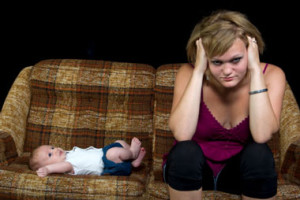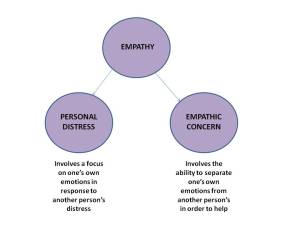 We live in a culture that is utterly unsympathetic to our children’s needs, especially when it comes to separation anxiety. The idea that our children – our babies – need us more than ever at this stage seems to somehow rub our collective thoughts towards fears of neediness, clinginess, and an all-around general inability to cope with the world. Yes, we fear that the anxiety our 9- to 18-month old children (on average) experience when they are apart from the person or people they trust most in this world to keep them safe and secure is somehow indicative of weakness.
We live in a culture that is utterly unsympathetic to our children’s needs, especially when it comes to separation anxiety. The idea that our children – our babies – need us more than ever at this stage seems to somehow rub our collective thoughts towards fears of neediness, clinginess, and an all-around general inability to cope with the world. Yes, we fear that the anxiety our 9- to 18-month old children (on average) experience when they are apart from the person or people they trust most in this world to keep them safe and secure is somehow indicative of weakness.
If most people could see this collective view as idiotic as it is, it might not matter so much. Though at that point it wouldn’t be a collective view, would it? However, most people really worry when their child experiences separation anxiety.
What if my child never leaves my side? What if he never learns to be with other people?
Although I understand the parental fear that comes with this – after all, no one wants their 40-year-old child clinging to their skirt in the supermarket – I can’t help but think what on earth causes this fear? I have never seen the teen who has to have Mom or Dad sit next to them in the high school classroom or the 30-year-old who still has to share a bed with Mom and Dad. I honestly won’t believe you if you tell me you can name a bunch of them because let’s be honest: Outside of cases where there’s a known developmental disorder, they aren’t there.
This leads me to think we’re in an Incan-like situation where we feel we must make a sacrifice for the sun to rise the next day, not knowing the sun is going to rise whether we sacrifice our virgins (in this case, our children) or not. We don’t need to force our children to separate from us to “heal” them of their anxiety. In fact, from a developmental perspective, the best thing we can do is to help our children feel safe during this time by being there. Forcing separation – or the virgin sacrifice, as you will – is not what brings about the rising of independence. In this case, unlike the virgin sacrifice, it actually can bring about the opposite: A fake or superficial independence because the foundation of safety and security that is being honed during the period of separation anxiety has been tampered with.
However, this collective view has created a rather serious problem for many parents: Surviving separation anxiety. Because our expectations for our children and ourselves are so skewed by this budding independence we think we should be seeing, we can struggle mightily when the period of anxiety begins. And continues. And continues. And continues.
What I hope you find below are some ways to help you cope with this period. Although this can be hard on parents, I always remind families that this is a good sign. When children don’t show any signs of separation anxiety, it raises a flag that something might (though not always) be amiss. And remember that children will show differing levels of anxiety based on their temperament. Just because you might have a very clingy child during this period doesn’t mean something is “wrong” – that’s just who your baby is. In the meantime, here are some things to try and help you stay sane…
Change your expectations.
I realize how hard this is. I myself have been struggling with it lately as I try to keep consultations and coaching and writing going with a baby that does not want me more than a foot away at any time. I can’t expect him to change (and I wouldn’t want him to) so therefore I must be willing to change myself and what I think I should be doing every day. I have slowed down on the cleaning that I normally would do. I am cutting back on work. I am no longer unpacking as I was, leaving a room full of boxes that need to be emptied. I struggle with these things every single day. Sometimes when I walk by the “box room” I want to scream. I have dreams of just throwing everything out, packing a tent and going to live in the woods. It’s not easy. Work is a must in terms of bringing in much-needed money to our family, but I will do what I can and accept if we need to go leaner for a few months.
When I struggle with my expectations, I remind myself that my son needs me. The hard part is that it’s rarely convenient when people need us. They don’t run into crises at the perfect time in our lives. So this is when we can show them exactly how much they mean to us. When I struggle with the loss of autonomy in my life at this point, I remind myself of when my mom died and my husband had to stop everything because I needed him. He had to stay away from his son who was still in Vancouver while we stayed in Toronto, stop work for a spell to help me handle her apartment (which did pose some financial difficulties, but we figured we’d get through them in the long-haul), and generally had a basket-case of a wife who wasn’t coping well and a 2-year-old daughter who didn’t know what was going on. He lost his autonomy and it wasn’t convenient, but he didn’t complain (though I’m sure he wanted to) and didn’t waver. He was there. Just as I need to be there for my boy.
Don’t make new transitions if possible.
Planning on starting a new daycare in the midst of separation anxiety? If you must, you must, but it’s generally not a great idea. More change often exacerbates the problem and can make your child clingier for longer. Of course, sometimes these changes are necessary and parents don’t have a choice. In these cases you need to make sure you have a reserve of understanding for your child because it’s going to be a lot harder on them than you might imagine. Try to transition slowly if you can. So if you know you’re going back to work when your child is a year, try to plan for a month to transition (this can be at the daycare or with the caregiver or even just learning to understand your absences with someone else) so that your child has time to lay down those neural connections in the brain that help her realize that these transitions are safe and you are still there for her.
 Empathize. Out loud.
Empathize. Out loud.
When stressed out with a highly fussy and upset child, I find it’s easiest to try and put myself in their shoes before I say anything else. I do this by starting with, “I know it’s really hard for you because you really want to be with me and you need me right now to feel safe…” before continuing with what I need to do and I say this out loud so that I really hear it. I find myself far more empathic when I start with this perspective-taking exercise than if I start by asking my child to let go or explain I’m going to the bathroom or whatever. That empathy goes a long way. Remember: Empathizing with your child is good for her, but it’s also really good for you too. Learning to take the time to take your child’s perspective will help you by flexing your perspective-taking muscles and making this process more automatic and thus easier to do in all interactions with your child. It also makes you realize what you’re getting frustrated with and it’s not a “bad” child or one who’s trying to manipulate you, but a child who is scared and needs you because you make him feel safe. Not such a bad thing, eh?
Practice mindfulness.
I really am the last person that should be writing these words, but I hope that one day I’ll take my own advice here. I suck at mindfulness. I go from 0 to stressed in 3.4 seconds and my jaws are clenched before I can take my first deep breath. However, I know the research and I know how helpful it is to learn and practice mindfulness. Practicing regularly and having this skill at hand can help calm the panic and anxiety that arises in you when you find your child’s emotions bigger than you can handle. When you feel yourself being pulled apart in too many directions, taking a moment to breathe into it and just accept can make a world of difference. Hopefully one day I too will experience this!
Ask for help.
Asking for help is not something most of us do well in our society. Somehow asking for help seems to be a sign of weakness, despite the fact that our society is currently the way it is because women cooperated in times past. However, when you feel yourself getting overwhelmed with nothing being done and a baby who just needs you 24/7, it’s time to call in reinforcements. Hopefully you have friends that are willing to fold laundry, sweep a floor, cook a meal, or if baby is willing, hold a baby. We are not meant to do it all ourselves and so you should get used to the idea of asking for help. Who knows? Maybe you asking for help will allow one of your friends down the line to return the favour and ask you for help.
Enjoy it.
Crazy, right? But it’s true – think about how this is the time you will get the most cuddles, the most hugs, the most joy when your child sees you and lap it all in. Soon your little baby will be off exploring the world, running away with a big smile and those cuddles will be fewer and further between. Not only is it time to really enjoy with your baby, but it also opens up time to do things most of don’t do in our hectic, work-obsessed world. If you’re kid insists upon sleeping with you, take the time to read a book, binge watch a tv show (with earphones), knit, or even – heaven forbid – nap! When only you will do with your baby, strap them on and go for a walk outside or just put a blanket down outside and get some fresh air. Try to enjoy your forced sabbatical from your day-to-day life and relish this precious time with the human being you brought into the world.






Wonderful post! It’s (sadly) refreshing to hear someone smart and learned remind us that the baby’s needs are paramount even (especially?) when they’re inconvenient. One day I’ll have a clean house again, and I’ll go out for martinis again, and I’ll pee alone again… but it will not be this day. My little one is scared to be away from me these days, and even though I know there’s nothing to be scared of, he doesn’t. And his fear is real. And if I were so afraid that I was going to cry out loud with tears running down my cheeks, I’d hope that even just about any random passerby would stick by me and say “it’s okay, you don’t have to be alone, I’ll hang out with you” so why wouldn’t we do that for our own little fragile snuggerbugs? Also, thank god for baby carriers so at least the diapers can get thrown in the wash once in a while. I pass by parents of teenagers who are walking 10 steps away from them with their headphones on, and I remember to breathe in my boy’s little baby smell and cuddle him closer, if he can be clingy, so can I.
Sorry to hear about your mom – sounds like hubby already had all the makings of a good daddy – I can’t even imagine losing mine… I hope things are looking as up as they can (messy house notwithstanding). Thanks for still working, us frazzled moms need your wisdom.
Keep dreaming of the martinis, we’ll all get there.
So separation anxiety should lessen around 18 months?
Typically, but all babies are different 🙂
Separation anxiety has been so hard for us. We’ve been very happy to go with the baby but it is still really hard. From when she was about 16 months old I’ve been working afternoons – while I work she is with my partner who hasn’t worked full time since she was six months old and since I went back to work we’ve shared the child care really 50/50. But we had about 2 months of tears almost every day each time I left. Things got better again for a bit (perhaps for three months it was ok) but we’re back to tears at every parting again for the last several weeks. It’s so hard for us all – I can see the little one’s distress, I find it really distressing and it is so hard for my partner to have a little one crying over the fact of her (when she is a lovely, responsive and fun parent). She is nearly two now and I just keep hoping it will end soon. It really is so hard.
Really wish I could get other people I live with to read and really understand this. My nearly 7 month old went through some separation anxiety when we recently moved in with our in laws. I was very happy to stay with her as I know it is temporary and also really imortant to know she was safe, especially with the move. However I was pressed repeatedly to leave her with them to go out. Everytime I was called back home as she was crying inconsolabley. The longest we lasted was when I was encouraged to go out for dinner with some other mothers, and that was only because her dad was also home. 1 hour in, just as I was starting to relax the phone rings and there she was screaming in the background. She is past the worst of it now but I am dreading any future incidences, not because of not being able to.leave her anywhere, but constantly defending my choice to stay!
I am so thankful for this post! Even though I spent five years before my daughter was born working in childcare, I have never come across a little one with a fear of separation as mighty as hers. I am realizing that that is likely because, being a daycare attendent and nanny, I was naturally caring for children who are used to being left. Come to think of it, I may never have cared for a baby or toddler that hadn’t been subjected to cry-it-out methods, both for sleep training and independent play purposes. Add to that all the voices of family and friends telling me that she, essentially, just needs to suck it up, no wonder I am concerned over my daughter’s intense emotions!
We have had a hell of time with our nearly nine-month-old; she has had incredibly powerful emotions since her birth. And they wipe us out! I feel a bit jaded, as I thought that implementing an evolutionary parenting approach would mean an easily-soothed, happy, securely attached, and sound-sleeping baby. I’m guessing, though, that that will come later, right? We gotta put in the exhausting work of creating that home base, that safe haven, from which she will eventually be able to confidently wander, yes? Intense protest against being separated from me, wakeful nights, and being highly sensitive is normal, right? We just become so anxious ourselves over whether or not something is wrong with our little one, so we try to “fix” every tear, every whine, every restless night, as if those things aren’t “allowed.” Exploring your amazing writing and reading about the experiences of others are helping us to cherish this time (as exhausting and stressful as it is!), accept our daughter’s emotions as normal, and better articulate to others why we do things the way we do them. Thank you!
Absolutely! And parenting in a biological manner doesn’t equal sound sleeping 😉 It just means being responsive to the trials and tribulations our children have and as they are all different, we need to respect that. Being supportive and enduring the separation anxiety is building the foundation for her security with you 🙂
Good luck and enjoy the ride Mama 🙂
[…] Oh, and if you want some more helpful advice on all this, not that what I’ve said has been helpful, then this might be worth a read. […]
Hi Tracy,
I love your writing and ideas. My husband wants me to just leave our (very anxious) 9 month old with family so we can go do something, and I told him when she trusts someone enough I will gladly leave her. He disagrees, and wanted “proof” that it’s bad for her to feel abandoned. Of course I thought of you for research based ideas…. But you don’t have any articles linked here. (It all totally makes sense to me….) Do you have any articles to back up these ideas on separation anxiety?
Thanks!
Sorry – he wants proof that feeling abandoned is bad or that she might feel abandoned?
I would recommend looking at the daycare research on here – under Alloparenting – and you can add Megan Gunnar’s 2019 career perspective to that list of research that’s already covered there.